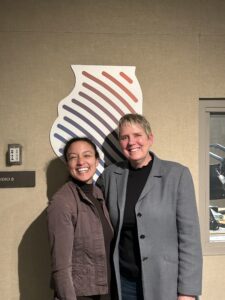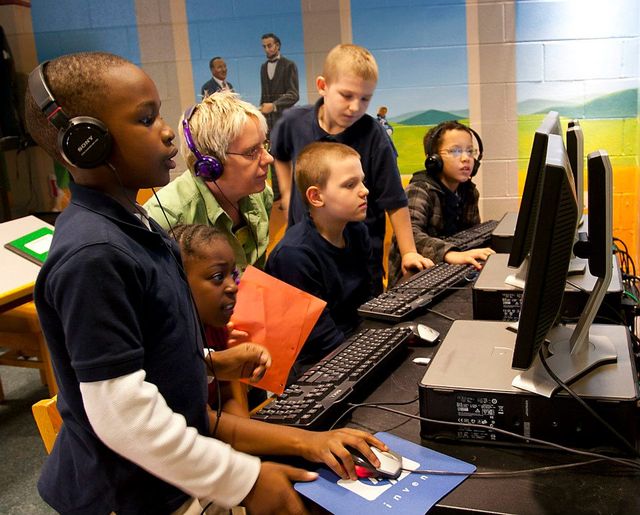For nearly 26 years, Kimberlie Kranich has worked to foster a more diverse, inclusive, and welcoming environment during her career with Illinois Public Media. As she prepares to retire at the end of the year, Morning Edition host Kimberly Schofield spoke with Kranich about her future, her position, and how her impact extended far beyond her office walls.
Kimberly Schofield: Your title is big…the Director of Community Content & Engagement and educational outreach. What all does it entail?
Kimberlie Kranich: So it’s kind of specific and specialized. But basically, engagement works with everyone at the station. The idea is ‘how do we have that two-way conversation with the audience we’re trying to serve?’ So, I try to be the bridge between the public and our content producers and put them together through, you know, listening sessions that are in person…to what we did during COVID – we did Facebook interactions, connecting kids to the teachers and knowing what’s going to happen with graduation. But it’s really a formalized position that says, ‘We need to be looking outward, all the time, to understand needs and then try to match our media expertise with those needs…to hold up a mirror to the communities we serve.’ The most satisfying thing is to be in collaboration with internal and external folks to make something happen, to support democracy, surely to create increased understanding, to share a voice or a story that’s not heard.

KS: Your role in engaging people to try to make them collaborate seems to extend beyond the walls of Campbell Hall and beyond the typical work hours. How have you been able to manage all of that?
KK: So I love telling stories. I love being active in the community, I love doing things with and for people or for myself, depending on what needs to happen. And I didn’t think I could do that and also be the kind of mother I wanted. I don’t think that society really promotes that or really allows it. So I felt like I could do a couple of things really well and then I’d be exhausted. I still don’t think that being a full-time mom, being a full-time person at a wonderful high producing beautiful station…that I can balance it all. And that’s okay. It wasn’t okay when I was younger and I was in my 20s and 30s and taking feminist courses and thinking, you know, that there was a split between mothers who decide to stay home – and that was their job, unpaid – and those of us who had a career…or those of us who did both – had kids and daycare and had a career. I just wanted something different. And I respect both of those…I respect those different time periods in my life. And I still will be active in the community when I retire from full-time work. So that’s not going to go away. I’m still going to have the passion and feeling like I have some kind of a drive…but not one that exhausts me as much. I need to get less exhausted with my passion with my drive, with my interest with my curiosity, and just find a little more balance.
KS: You’ve certainly worked on a lot of different projects during your time here…like the Illinois Youth Media. What programs have you really found fulfilling?
KK: There’s a lot of youth media. Youth Media Workshop was a specific project that was brought to WILL by Dr. William Patterson. And he used to watch PBS as a kid. He came to me and he said, “What we need to do is we need to find the kids in school who are social influencers, but may not be the best with grades, and let’s give them something to do that’s constructive, that will also build their skills, and will also tell stories that haven’t been told.” And so the two of us really formed this awesome working relationship where he would find African Americans in the community – elders – who would be willing to talk to young people…to tell them the history, to tell them the challenges, to tell them the opportunities. And then the young people, we would get from the public schools, we’d partner with the teacher. And we put this intergenerational group together, students and elders, and that was how they learned about African American history, both in this community and nationwide. And the idea was the importance of education and not taking it for granted. And learning about some of the national struggles and how they played out here. So working with young people, it was always a small group, everything from “Oh my god, I have to call this person and ask for an interview. How do I do that?” to “We’ve got all this tape, what part of what they said should we use for the documentary,” and everything in between. So you’ve got kids that are – the youngest we worked with was seventh grade and the eldest was 12th grade. We won an award, a public engagement team award, for a one of the works we did. And then one of the really fun ones was And the Beat Goes On: The Spirit in the Legacy of the Douglass Center Drum Corps. Oh, that was that was really cool because they’re interviewing people with these $50,000 cameras, right? In the studio, learning how to light, how to strike, how to ask questions, and then how to edit. And that story, which is on our website, on our YouTube channel, was shown so many times in the community as a way of, you know, hoping to inspire the next generation of the drum corps, like maybe it would get restarted. It didn’t happen to get restarted. But the history is there now and it was storytellers…and one of those storytellers came in and interviewed his mother for our Veteran’s Day segment.
KS: On the 15th of December at the Virginia Theater, Illinois Public Media is doing a screening of an episode of The Black church. This is our story. This is our song. You’ve been involved with that. Can you talk about that event a little bit?
KK: Yeah. So look…there’s this national, The Black Church, series by Henry Louis Gates, Jr. Let’s bring that here, but let’s also do a panel. Let’s talk about what some of the black ministers here think about the episode we’re watching together. And what’s the state of the Black church in central Illinois today. And so one of my jobs is to come up with the panel, have a pre-meeting with them to kind of find out what they think, and then figure out what are the best questions from that discussion that I can ask during the panel discussion. And then I facilitate Q&A or comments from the audience. So again, it’s more than a film watching. You’re learning history, you’re getting the chance to network, you’re meeting people, you’re listening to people, you’re learning. That’s really the joy of the whole thing is you’ve got this good story and then you make it relevant locally and you bring people together in a space and things can happen.
KS: It is really amazing. When we had Friendsgiving here, for example, where members of the community come to the building to get a tour of this station…and truly putting faces to…not even names…because I just know there are people listening. So it’s nice for even me, who works here, to be able to attend events like this that you have such a big hand in facilitating and putting together. And community members trust you to be able to create that space for them to be able to share their voice and share their work.
KK: Yeah, thanks, Kimberly, for saying that. I’ve been thinking a lot about the length I’ve been here and the different people I’ve seen come and go. And I think we’re at a really good balance with Illinois Public Media. What I mean by that is, I’ve seen a lot of change here. I’ve seen different leadership, I’ve seen different staff. I have to say…in the almost 26 years I’ve been here, I think we are almost at the right staff and right leadership for the moment that we’re serving. I really am excited about who’s here. A lot of new folks, a lot of talented folks, some folks that have been here a little longer than me. But I have this long-term perspective. I’m happy to have contributed to that. And that’s another thing. When you’re in a community so long and you do things in the community, then you do get the trust. Because people know you. That’s been a strength that I’ve brought to the station…is being here so long and having those relationships, I can bring folks in. All of our staff do a great job of that. And I just think the leadership we have and the staff we have now is so important to the democracy and the moment we’re in. And embracing the changes that came out of COVID and the uprisings against George Floyd’s murder. I honestly believe that our whole industry had an opportunity to grow big time and be much more diverse and much more willing to represent in ways we hadn’t before. But we need the leadership to say yes, and our leadership is saying yes. Not perfectly, but we’re working on it.
KS: What are you looking forward to the most at the end of the year, at your time away from here? Words of wisdom are more than welcome for employees, community members, co-workers…
KK: I’m gonna sing my answer.
KS: Please do.
KK: This is what I’m looking forward to, “This little light of mine. I’m gonna let it shine. This little light of mine. I’m gonna let it shine. This little light of mine. I’m gonna let it shine. Let it shine, let it shine, let it shine.” Yeah, just let my light shine in whatever I’m doing. Whether I’m with my daughter…I’m going to continue to teach comprehensive sexual education. I love that. I love working, you know, with kids and their parents. I’m going to hopefully do a radio show with some Alpha Generation kids. Maybe I can do some freelance stuff and I’ll be in the community just enjoying, traveling. But really, I really think…let your little light shine wherever you are. And know that that is your gift.

